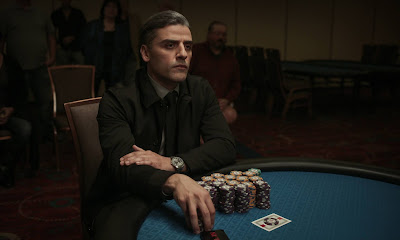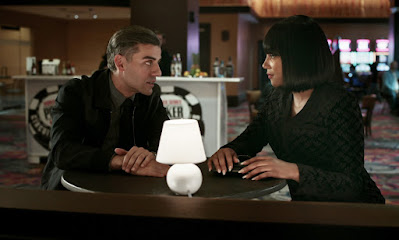William Tell, as you might surmise, is not really the man’s name. “Bill,” says La Linda (Tiffany Haddish), his emergent card-playing manager, the comically heightened emphasis Haddish puts on that one word all at once suggesting that’s not your real name and you know that I know that it’s not your real name but I’m not going to ask you why it’s not your real name. It takes us awhile to glean the exact reason for Tell adopting this pseudonym, though clearly it connects to an eight-year prison sentence. That’s where he learned to count cards and took an unexpected liking to incarceration’s circular rhythms, epitomizing why he now prefers an unvarying one-man circuit of card-playing by way of card-counting, earning just enough to get by and not arouse suspicion. In big close-ups, Isaac as Tell betrays nothing, a true cinematic representation of the ancient poker face axiom, though slow zooms become virtual drills to Tell’s head, like one in his motel room where he tosses and turns as he sleeps, slowly boring in on his secretive past.
Tell, it turns out, less like any kind of big reveal than merely a big piece of the psychological puzzle, is Tillich, formerly Private first class, who was stationed in Abu Gharib, where he interrogated detainees by torturing them, yielding his jail sentence. Occasionally, “The Card Counter” flashes back to these scenes of terror, cacophonous and rabid where the rest of the movie is calm and controlled, recounted in extreme wide-angle lens that makes it seem as if he have been dropped into a distorted funhouse of America as Home of the Brave, the garishly bright lighting rendering those terrible images of that American tragedy as a brutal exploitation film. Tell’s disciplined card-playing allows him to cope with his anguish, though not cure it, evinced in a military conference he attends where the way he walks past tables looking, but not touching, suggests a ghost visiting old haunts. This is also where he meets The Kid.
The Kid’s father was at Abu Gharib too, knew Tillich, and carried the same emotional toll. Rather than play cards, however, the old man acted out, violently abusing his family and eventually committing suicide. Having inherited his father’s emotional burden, accruing considerable financial debts and leading an aimless existence, The Kid decides the overwhelming need to make right what is wrong means somebody needs to pay. That somebody is both his dad’s and Tell’s ex-commanding officer, John Gordo (Willem Dafoe, his wild hair denoting all we need to know about the character), who The Kid wants to kidnap and torture, a woebegone plan culled from third-hand Internet information that Sheridan has his character recount in a zoned out if weirdly serene and confident voice that is at once frightening and pathetic. Tell cautions The Kid against the futility of an eye for an eye, though he also enacts practical measures, agreeing to play poker tournaments under the eye of La Linda for bigger purses and more money in an effort to pay off The Kid’s debts and allow him to start his life over.
As a character, Tell, really, is nothing more than two traits, card-counting and his torturing past, which might seem to suggest he is lacking in some way, missing crucial dimension. That lack of characterization, however, is the character. Schrader even has La Linda point it out, asking Tell if he has interests beside cards. Isaac’s grayish hair rhymes with his colorless clothing which rhymes with his nondescript hotel rooms, even before he swaddles everything in white sheets to duplicate a prison cell. This austere lifestyle might be a hallmark of Schrader protagonists, but even “Light Sleeper” explored the finer points of the drug trade while “First Reformed’s” Toller not only led his church but gradually transformed into a climate change zealot. No matter how many times Tell breaks down the finer points of card game, on the other hand, the detachment in Isaac’s voice, a far cry from, say, Robert DeNiro’s rollicking explainers in “Casino”, betrays the card games as not being the point. No, in “The Card Counter” the nature of playing cards, going from town to town, sitting in a circle, dealing a new deck, takes on a quiet spiritual quality, going round and round, just like the character says, trying to work things out.
In this way, both The Kid and La Linda become pointed reflections of Tell. What Tell is trying to leave behind, The Kid lets gnaw at him and ultimately consume him. La Linda, while describing early-life difficulties, also explicitly states she has found a profession she’s good at, content with, and Haddish’s laid-back but effusive demeanor evokes someone entirely comfortable in her own skin. The Kid is what Tell is; La Linda is the plain to which he’s trying to ascend. In the end, he gets there, through an astonishing sequence that narratively is nowhere near as mystical as the floating sequence in “First Reformed” yet formally just as transcendental, an image of human connection that seems to virtually eradicate a partition between Tell and La Linda. In that moment, Tell’s cycle of suffering ends.





No comments:
Post a Comment